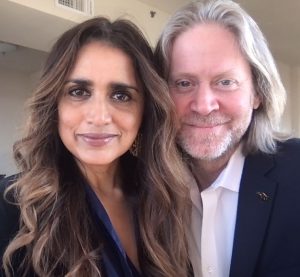Why Kamala Harris is So Important

(Atlanta, May 20, 2021) When I was born in a small village in India, Indira Gandhi was Prime Minister of India. She was PM from 1966 to 1977 and then again from 1980 to 1984. She remained in office until she was assassinated in 1984 by her own guards in a horrific attack. She is a controversial figure in India, but I was born into a world where SHE held the highest office in the land. I would emigrate to the United States during her first tenure as Prime Minister and though I would question some of her policies later, as a girl, there was no question to me that a woman could rule one of the world’s largest democracies, even one as patriarchal as India.

The truth was, during her rule and after, Indian women still struggled with access to education and equal rights. Though Indira Gandhi was raised in an egalitarian manner by her parents, India was not an egalitarian society. She didn’t make all of that go away, but Indians chose to elect her. My grandfather, a mediator and a man who rarely agreed with the norms of our Indian society, would say to me that if I was not allowed into certain halls or rooms, it was because they were filled with small minded people. He told me that only great minds could be inclusive and make decisions based on the power of the argument rather than the person making the argument. He questioned some of Indira Gandhi’s decisions, but he supported a woman’s “God-given right to lead.”
Other countries, likewise have placed women in the top positions sooner, including Golda Maier in Israel, Benazhir Bhutto in Pakistan, Margaret Thatcher in the United Kingdom. The list goes on. Unfortunately, the list is not long when compared with male leaders. Still, in the 20th Century, at least 46 countries had Prime Ministers or Presidents who were female. Today, from Bangladesh to Germany, New Zealand to Nepal and Taiwan to Ethiopia, women are head of state or head of government in 23 countries. (Germany’s Angela Merkel and New Zealand’s Jacinda Ardern have been praised for their leadership during the pandemic and women-led countries have fared much better in terms of COVID fatalities.) Consider there are 193 United Nations member states. According to UN Women, 119 countries have never had a woman leader. That includes the United States of America.
On January 20, 2021, more than two hundred and thirty-one years after the first Presidential election in the United States, Kamala Harris became the first female Vice President of the United States. When she took the oath of office, we normalized something that had been so fleeting. Together, as Americans, we said a woman belongs in the highest levels of our government. She is a symbol of everything that any girl in America can become and if a girl ever felt like she needed permission to go where women had not been before, she has it now.

Former Secretary of State, Hillary Clinton posted a photo of our Vice President and her grandnieces, writing “It delights me to think that what feels historical and amazing to us today—a woman sworn in to the vice presidency-will seem normal, obvious, “of course” to Kamala’s grandnieces as they grow up. And they will be right.” What women in America have lacked for generations is that “of course, I can” feeling. Vice President Harris is to America’s current generation of girls what Indira Gandhi was for me, this woman who makes no excuses for being a woman, who is fully capable of leading and who is an example of what they can attain. In 1952, Indira Gandhi wrote to her friend Dorothy Norman, in the U.S., “I believe in women being able to do everything…Given the opportunity to develop, capable Indian women have come to the top at once.” She was not a feminist, but in those days, that could have been a political decision. It was clear she saw herself as an equal to any man.
To know the impact of the Vice Presidency of Kamala Harris, we have to consult those who feel it most. My daughter and her friends, all teenagers living in Austin, Texas, will tell you they are all empowered by the election of our new Vice President. “To have a woman and a woman of color as our Vice President – I am overjoyed! It’s so inspiring and uplifting to see someone that has similar roots to me in the office of Vice President. Finally, girls can look up and see someone that looks like them,” said my daughter, Lark Adrian. Her friend, Lauren Villalta added, “As a teenage girl who likes to keep up with politics, seeing a powerful female come into the Office of Vice President means a lot to me. I feel like no matter what side you are on, and even if you don’t get into politics, it’s so important to see a woman in that position, especially a woman of color, because, we as girls just don’t see representation like that.” Sabina Garza, another teen, said “She inspires and makes me optimistic about what I can accomplish as a young woman of color.”
It’s like that quote from Maya Angelou — it’s not what we say or what we do that matters most, but how we make people feel. Kamala Harris as Vice President makes them feel something when they see her.
When Barack Obama became President, it was a similar moment. Black children and children of color saw themselves in him. Not a dream, but a reality. Now, we add to that. Our new Vice President represents multiple Americas – immigrant, Asian-American, black and woman.
It is a paradox that a country that has been so far ahead of the world in so many areas is so behind when it comes to women in the highest position of our government. Women are more than 50 percent of the electorate in the United States, but we still don’t elect women to the Presidency. Vice President Harris is the closest we’ve come. When you take that in, you see how important she is – how important this is for America’s next generation of women.


I wish my grandfather could see this, but I am grateful his great-granddaughter can live in it.
Jade Kurian is journalist and co-founder of Latakoo, an end-to-end video workflow software solution for content producers worldwide. Founded by former network news anchor Patti Tripathi, the US-based Saris To Suits ® focuses on building awareness to break down the barriers that constrain the advancement of women and girls. We aim to advance women’s empowerment, education, gender inclusivity, equality and social justice. www.SarisToSuits.org



